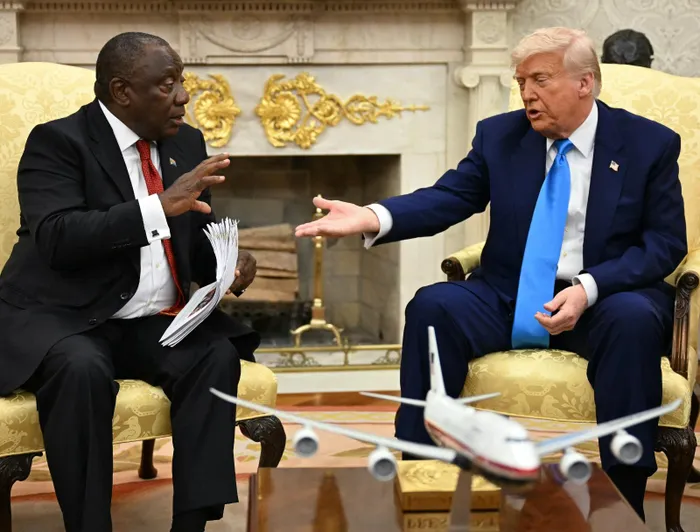Fuel levy hikes and Oval Office optics: South Africa’s workers deserve more than empty promises

Wednesday’s meeting between Presidents Ramaphosa and Trump a symbolic gesture to reaffirm U.S., South Africa relations produced lofty rhetoric about “economic growth” and “job creation," says the writer.
Image: AFP
Tahir Maepa
While President Cyril Ramaphosa stood shoulder-to-shoulder with U.S. President Donald Trump in the Oval Office on Wednesday, discussing trade and “mutually beneficial partnerships,” millions of South African workers were bracing for a far less glamorous reality, another punishing fuel levy hike.
The timing of these two events—one dripping with diplomatic pomp, the other dripping with desperation paints a stark portrait of a government increasingly out of touch with the daily struggles of its people.
The Minister of Finance’s decision to raise fuel levies, effective immediately, is not merely a fiscal adjustment it is an existential threat to households already teetering on the edge. For workers earning minimum wage, the levy increase per litre means choosing between a full meal and a full tank.
For mothers commuting from townships to suburbs for domestic work, it means sacrificing school fees to cover taxi fares. For small-scale farmers transporting goods to markets, it means profits evaporating before the first sale.
This levy hike will cascade through the economy, transport costs will rise by an estimated 10–15%, according to industry analysts, while food inflation, already at 14% year-on-year, will climb further as logistics chains pass costs to consumers with wage stagnation resulting in workers’ incomes shrinking in real terms, with no relief in sight.
The government claims this move is necessary to stabilize revenue and fund public services. But when will “stability” come for the single parent working two jobs just to afford paraffin and bread?
Meanwhile, Wednesday’s meeting between Presidents Ramaphosa and Trump a symbolic gesture to reaffirm U.S., South Africa relations produced lofty rhetoric about “economic growth” and “job creation.”
Yet, conspicuously absent was any mention of how global trade deals or foreign investment will address the suffocating cost-of-living crisis at home.
President Ramaphosa’s focus on international diplomacy is not inherently misguided. South Africa needs foreign investment and trade allies. Butjuxta posed against the fuel levy decision, it reeks of hypocrisy. How can a government court foreign capital while bleeding dry the very workers who sustain the economy?
The Oval Office photo-op cannot mask the truth: South Africa’s working classis being asked to subsidize fiscal failures through regressive taxes, while elites debate abstract economic theories in air-conditioned rooms.
Trade unions must demand urgent action to shield workers from this policy’s fallout:
- Temporary levy exemption for low-income earners.
- Fast-track investments in safe, affordable rail and bus systems to reduce reliance on costly private transport.
- Adjust wages and social grants to reflect inflation, ensuring workers are not pushed into poverty.
To President Ramaphosa, Sir’ your legacy will not be written in Oval Office handshakes, but in the kitchens of Khayelitsha, the taxi ranks of Soshanguve, and the factories of Ekurhuleni.
If this administration truly wants to “grow the economy,” start by listening to those who keep it running.
South Africa cannot afford leaders who navigate global stages while ignoring local suffering. The fuel levy hike is more than a tax it is a betrayal of workers’ trust.
Wednesday’s Oval Office meeting may dominate headlines, but history will judge this government by its willingness to uplift, not exploit, the people it serves.
* Tahir Maepa the Secretary General of the Public Service and Commercial Union of South Africa (PSCU) and founder of Resistance Against Impunity Movement (RAIM) NPC.
Cape Argus
Related Topics:
